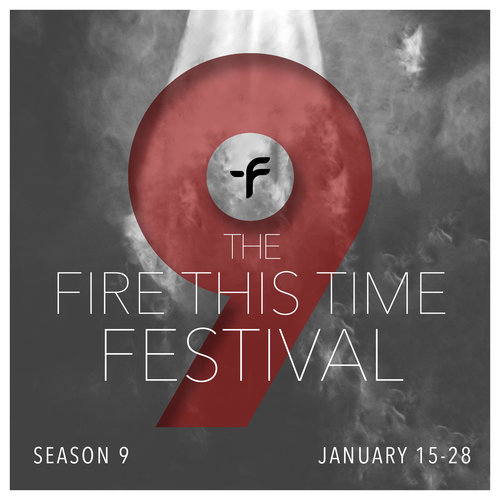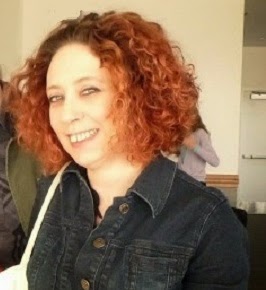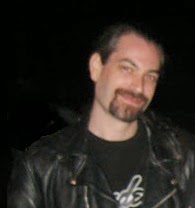 The Fire This Time - Season 9: 10-Minute Play Festival
The Fire This Time - Season 9: 10-Minute Play FestivalDirected by Candis C. Jones
Presented by FRIGID New York and Horse Trade Theater at the Kraine Theater, NYC
January 15-28, 2018
The consistently excellent The Fire This Time Festival, which features new plays from artists of African descent, is in its ninth season. Among its schedule of readings and performances, the 10-Minute Play Festival is a consistent highlight, and this year's is no exception. Showcasing the work of six playwrights and directed by Candis C. Jones, the festival, performed by a skillful cast to an enthusiastic packed house on the night that we attended, engages a range of topics and tones that nonetheless echo and resonate with one another, creating a whole that is intriguing, affecting, and entertaining right through the curtain call.
Shelley Fort's Poppy kicks off the proceedings, following the eponymous Poppy (Claire Fort) as, having left school and home behind, she people-watches on a city bus line and commits petty kebab theft. Her adventure takes a hard turn into surrealism when she ends up in a courtroom that would be at home in a Lewis Carroll novel, accused of a thought crime. Her infraction is inextricably tied to her gender, which only adds to the ire of prosecutor Cookie (Kevin Necciai), sheathed in a sparkly dress and resentment. Fort makes Poppy believably young and winningly spirited, and the play repeatedly balances the uncertainty of successful escape and self-direction, underscored by Poppy's father (Kambi Gathesha) removing her shoes, with the importance of trying anyway.
Juxtaposed with Poppy's busier, multi-part narrative, the conceit of Charly Evon Simpson's A House is one of bare simplicity: a brother, B (Corey Allen, who plays a surreal surprise witness in Poppy), has a conversation with his sister, Jackie (Erin Cherry), in front of a house. The house in question is their childhood home, which they must decide what to do with, and while they disagree over whether the abode was spooky, they are in accordance that the memories that haunt the structure are overwhelmingly bad ones. Such ghosts are no easier to deal with than the supernatural variety, and even Jackie herself initially frightens B by appearing silently behind him (she has learned quietness from attending a retreat in the woods, a fact that leads a quick, funny deconstruction of urban and rural stereotypes). Aided by strong performances from Allen and Cherry, A House deftly implies a rich history for its characters in a brief running time, lending affective weight to its snapshot of emotional reckoning with the past and the future.
The Falling Man, by Gethsemane Herron-Coward, incorporates a literal snapshot into its story: Richard Drew's widely-known photograph of a man falling from the North Tower of the World Trade Center on 9/11, captured in a moment of inversion parallel to the building's vertical lines. The identity of the man has never been confirmed, and the play imagines both the final moments of the man (Kambi Gathesa) before he jumps to his death and the resistance of his daughters (Lauren F. Walker and Ashley Ortiz) to believe that it is their father in the photograph. Confronted with the question by a journalist (Kevin Necciai), they are forced to confront how to interpret such a death, as well as the earlier, smaller ways in which their father had been lost to them and how to mourn all of this (his Latinx daughter wonders if she must grieve in a language in which she is an outsider). As the man, Gathesa leavens the pathos of his scenes with some humor without detracting from their impact; and when the man lament over his inability, as a black man, to have control over his own body draws a parallel between the singular, catastrophic removal of bodily autonomy imposed by the attack and that imposed every day on him as an hourly employee, effectively introducing a wider political dimension.
Labor and race play roles in Sandra A. Daley-Sharif's Anonymous as well. Nina (Claire Fort) has become suspicious that the unknown painter whose work is racking up millions in sales is actually her mother, Noelle (Erin Cherry). While Nina believes that art must be seen in the context of its creator's personal history, Noelle argues that there is liberty in anonymity, though she also admits that part of her reluctance to publicly claim her work derives from fear. Nina is also incensed that the public has decided that Noelle's paintings must be the work of a wealthy white male artist who is having a renaissance following a trip to Africa, and these conflicts connect directly to long-running debates over the connection between art and artist. Nina pointing out that the assumed artist is not refusing credit for her mother's work brings to mind, for example, the 1990s scandal over poetry published by literature professor Kent Johnson as invented survivor of the Hiroshima atomic bomb Araki Yasusada, just as it evokes questions about how we should view art involving men exposed by the #metoo movement (which has had too few intersectional moments to date). Anonymous thought-provokingly engages with these larger issues while grounding itself in the very specific relationship between two individuals whom Fort and Cherry embody with warmth and strength.
The Rider, by Mona R. Washington, is the only pure comedy in the group, a well-paced piece of comic escalation that satirizes the transactional aspects of romantic relationships, particularly marriage. Ade (Corey Allen) is just back from a business trip to London, and while he wants to move along to the bedroom, his fiancé Julia (Lauren F. Walker), a sculptor, wants to get through a few points on her wedding-planning list first. Ade's reluctant acquiescence leads to his discovery that there have been some unexpected revisions to their prenuptial agreement. Allen and Walker play off one another maintain an undercurrent of affection to their interplay as Ade becomes increasingly exasperated, and Walker in particular shines here as someone who asks why, if marriage involves what amounts to a salary negotiation, she shouldn't quantify the rest of the relationship as well.
If The Rider is the most buoyantly comedic, then Black, White & Blue, by William Watkins, the final play of the group, is the most darkly funny. Watkins' play drops in on rehearsals of a play about a black man (Kambi Gathesha, fantastic again), who is pulled over by a white cop (Kevin Necciai) and shot to death as soon as he reaches towards the glove compartment of his car. The actor playing the officer, however, can't understand his motivation, while the director (Ashley Ortiz) can't accept that the victim didn't do something to invite being shot five times and encourages the actor playing the driver to lean into the "urban" qualities of his character. Although the onstage play is based on a transcript of an actual event, the director maintains that she is responsible for producing theater, not truth. As the lines between real life and rehearsal get a bit blurry, Black, White & Blue constructs a withering satire of the stereotypes and rationalizations involved in one side's truth of police violence. The actors in this play-within-a-play, it suggests, are not the only ones who must refuse to follow the provided script.
In its 2018 season, The Fire This Time offers a compelling set of short plays that only gets stronger as it goes on. The festival will have concluded by the time that this review is posted, but it has highlighted a talented group of writers and actors whose work audiences would be well advised to look out for while we await the next brightly burning season. - Leah Richards and John Ziegler


Dr. Richards is an English professor in NYC, and spends her free time raising three cats and smashing the patriarchy.
When not writing reviews, Dr. Ziegler spends a lot of his time being an Assistant Professor of English in NYC and playing guitar in a death metal band.
